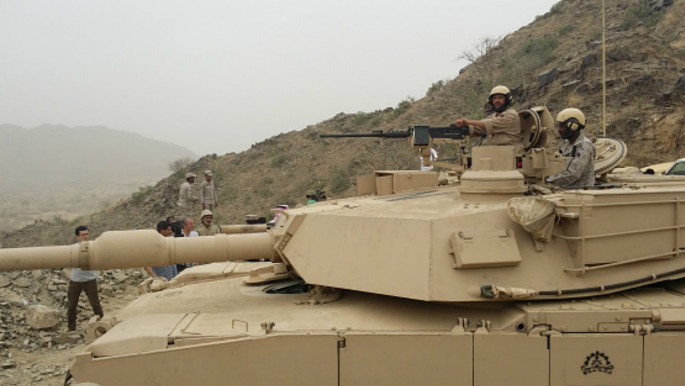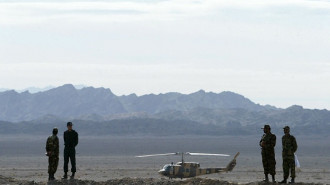Saudi economic reforms to boost domestic arms industry
Dubbed "Vision 2030," the long term economic plan was presented by the deputy crown prince Mohammed bin Salman, second in line to the throne and son of current Saudi King Salman.
The plan outlined long term strategies to diversify the economy and reform the military procurement sector.
Although Riyadh is one of the world's biggest military spenders, only two percent of its defence budget is spent domestically.
"Vision 2030" will see this figure rise to "30-50 percent to endow the country with a new industry," Mohammed bin Salman said in an interview with Saudi-owned Al-Arabiya television.
The new military procurement strategy, which was approved by the Saudi government, will see new suppliers required to work with local Saudi companies in order to secure contracts.
"From now on the ministry of defence and other security and military agencies will only place a contract with a foreign supplier if it is linked to a local industry," Mohammed bin Salman said.
| Mohammed bin Salman is second in line to the throne and son of current Saudi King Salman [Getty] |
According to the crown-prince, the strategy is already being applied to existing contracts.
"We are proceeding with a restructuring of several of our military contracts to link them to a Saudi industry." Mohammad bin Salman added.
A 84-page booklet outlining Saudi Arabia's economic transformation plan released Monday said the kingdom is the world's third-biggest defence spender.
But its local defence sector currently consists of just seven companies and two research centres.
The local military-industrial complex has begun developing spare parts, armoured vehicles and ammunition but will expand "to higher value and more complex equipment such as military aircraft", the plan said.
Stimulating home-grown defence industries will help reduce military spending while encouraging other sectors and creating jobs, the plan added.
 |
Stimulating home-grown defence industries will help reduce military spending while encouraging other sectors and creating jobs. |  |
The plan for military self-sufficiency comes in the wake of a controversy surrounding arms sales to Saudi Arabia.
Following the kingdom's leading role in the Yemen war on the side of Abd Rabbuh Mansur Hadi's government against Houthi rebels, a number of movements inside countries supplying arms to Saudi Arabia have sought to block sales to the kingdom.
 |
| Saudi Arabia plays a leading role in the Yemen conflict, fighting on the side of Hadi's government against Houthi rebels [Getty] |
A recent non-binding resolution was passed by the European parliament forbidding arms sales to Saudi Arabia, while leading human rights organisations including Amnesty International have called for an arms embargo on Saudi Arabia.
Increased tensions between Saudi Arabia and the US, following local pressure against the Obama administration to release confidential files relating to 9/11 and following Saudi displeasure against the US-led Iranian nuclear deal, have brought into relief the kingdom's extensive reliance on US arms.
The strategy presented by Mohammad bin Salman will seek to alleviate concerns within the Saudi government that over-reliance on foreign military supplies will allow it to be held hostage to the dictates of foreign countries at a time when the US seeks to "pivot away" from the Middle East.
Moving away from oil dependency
The long-term reform plan also marks the beginning of a hugely ambitious attempt to move Saudi Arabia beyond oil, the backbone of its economy for decades.
 |
The long-term reform plan also marks the beginning of a hugely ambitious attempt to move Saudi Arabia beyond oil, the backbone of its economy for decades. |  |
"Vision 2030" seeks to create the world's largest sovereign investment fund and sell shares in state energy giant Aramco.
 |
| Vision 2030 seeks to sell shares in state oil giant Aramco [Getty] |
"This is not a dream. This is a reality that will be achieved, God willing," Mohammed bin Salman told reporters, many of them invited from around the world.
Although it comes against a steep fall in oil prices, the plan "was not created only" to face that challenge.
"We have all developed an oil addiction in Saudi Arabia and this is dangerous and has hampered development in many sectors during past years," he said.
Part of the plan is "to sell less than five percent of Aramco" in an Initial Public Offering [IPO] on the stock market, valuing the company at between $2 trillion and $2.5 trillion.
By "selling even one percent of Aramco, it will be the largest IPO in the world", Mohammed bin Salman added.
Part of the funds from the share sale will be used to set up a $2-trillion sovereign wealth fund [SWF], which would easily surpass Norway's $865-billion fund as the world's biggest.
'Largest on the planet'
SWFs are commonly used as investment arms for oil-dependent nations seeking to diversify revenue streams.
With so much capital on its hands, the Saudi SWF would make Riyadh one of the single most important global investors.
It will be "by far the largest on the planet", Mohammed bin Salman said.
 |
The reform programme aims to propel the kingdom from its ranking as the world's 19th largest economy to the top 15. |  |
The reform programme aims to propel the kingdom from its ranking as the world's 19th largest economy to the top 15.
Under the plan, the share of non-oil exports will rise from 16 percent to 50 percent of non-oil Gross Domestic Product.
For decades, Saudi Arabia, the largest economy in the Arab world, enjoyed a windfall from its massive and easily exploitable oil reserves.
Flush with oil revenues, the nation has built up enormous fiscal reserves and provided its 21 million citizens with a generous system of public employment, welfare benefits and subsidised utilities.
Agencies contributed to this report.

![Palestinians mourned the victims of an Israeli strike on Deir al-Balah [Getty]](/sites/default/files/styles/image_684x385/public/2024-11/GettyImages-2182362043.jpg?h=199d8c1f&itok=xSHZFbmc)


![The law could be enforced against teachers without prior notice [Getty]](/sites/default/files/styles/image_684x385/public/2178740715.jpeg?h=a5f2f23a&itok=hnqrCS4x)
 Follow the Middle East's top stories in English at The New Arab on Google News
Follow the Middle East's top stories in English at The New Arab on Google News
![Fakhrizadeh [AFP] Fakhrizadeh [AFP]](/sites/default/files/styles/image_330x185/public/media/images/774C39F7-8F7A-4D67-B998-27D102FCB4A7.png?h=d1cb525d&itok=j9eGvunV)

